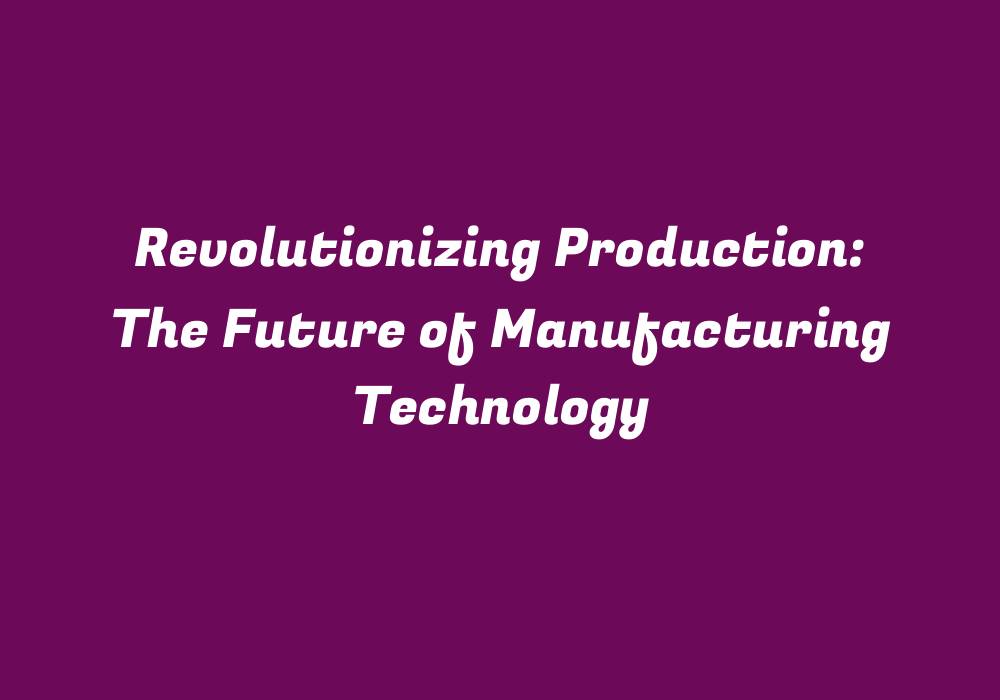Introduction to Revolutionizing Production: The Future of Manufacturing Technology
The manufacturing sector has undergone a significant transformation over the past few decades due to advancements in technology. With rapid progress, we have witnessed an evolution from conventional mass production methods to the modern era of smart factories that rely on automation and data-driven decision-making. The future of manufacturing is set to revolutionize yet again as artificial intelligence (AI), internet of things (IoT), 3D printing, and robotics emerge as powerful tools, shaping a more efficient, flexible, and sustainable industry. This article discusses the impact of these innovative technologies on the future of production and its potential benefits for businesses.
Embracing AI: Intelligent Manufacturing Systems
Artificial intelligence has made remarkable strides in various industries, and it’s no surprise that manufacturing will also benefit from its integration. By incorporating predictive analytics and machine learning capabilities, smart factories can optimize processes, anticipate potential issues, and make informed decisions to enhance overall production efficiency. As a result, the future of manufacturing is expected to witness a shift towards intelligent manufacturing systems that rely on AI for real-time data analysis, quality control, and resource management.
Enhancing Supply Chain Management with IoT
The internet of things (IoT) has made its way into nearly every aspect of modern life, including the manufacturing industry. By connecting various devices and systems within a factory network, the IoT enables seamless communication and data sharing that can revolutionize production methods. For example, sensors can monitor equipment health, enabling predictive maintenance to prevent costly downtime and improve uptime efficiency. In addition, real-time tracking of materials and finished goods throughout the supply chain will enhance visibility and reduce inventory errors, leading to greater accuracy and responsiveness in production planning.
3D Printing: Revolutionizing Mass Customization
As additive manufacturing becomes increasingly accessible and cost-effective, 3D printing technology has already begun to transform various industries, including manufacturing. The future of this innovative process lies in its potential for mass customization and on-demand production. Instead of producing large quantities of standardized products that may not meet individual needs, manufacturers can now create unique parts and products tailored to customers’ specific requirements at a fraction of the cost and lead time.
Robotics: Redefining Automation and Human-Machine Interaction
The introduction of robotics in manufacturing has already transformed the industry by reducing production costs and increasing efficiency while minimizing errors and workplace accidents. As the technology evolves, robots will become more adaptive and capable of collaborating with humans, fostering a symbiotic relationship between machine and human workers. With the advancement of cobotics, humans and machines can work together in an enhanced environment that enables seamless communication and better decision-making for optimizing production processes and improving overall workflow.
Sustainable Manufacturing through Digital Transformation
The future of manufacturing will also focus on environmental responsibility as companies embrace digital transformation to reduce their carbon footprint and minimize resource consumption. With the integration of smart sensors, predictive analytics, and data-driven decision-making, manufacturers can optimize energy usage, streamline waste management, and improve the overall efficiency of production processes, leading to a more sustainable industry.
Conclusion
The future of manufacturing technology will continue to revolutionize production methods through advancements in artificial intelligence, the internet of things, 3D printing, and robotics. These cutting-edge technologies promise to deliver numerous benefits for businesses, such as increased efficiency, enhanced sustainability, improved supply chain management, mass customization, and streamlined communication between humans and machines. As manufacturers embrace these innovations, they will shape a more agile, flexible, and environmentally responsible industry that can adapt to the ever-changing needs of consumers and business environments.
